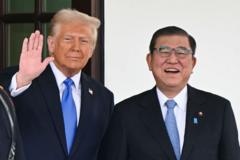Is Trump’s New Trade Deal with Japan a Game Changer?

Understanding the Impacts of the US-Japan Trade Deal
In a significant announcement, former President Donald Trump claimed that the United States has reached a "massive" trade deal with Japan, a critical player in global trade. This proposed agreement entails Japan investing approximately $550 billion into the US economy, alongside a 15% reciprocal tariff on certain goods. The potential benefits and implications of this trade deal are extensive, affecting various sectors within both nations. In this article, we'll explore the key elements of the deal, its potential impacts on the US economy, and what it means for consumers and businesses alike.
Key Components of the Trade Deal
Understanding the core elements of the deal is essential for grasping its significance. Here are the primary components as outlined by Trump:
- Investment Amount: Japan is projected to invest $550 billion into the US economy.
- Reciprocal Tariffs: A proposed 15% tariff on selected goods imported from Japan.
- Market Access: Japan is expected to open its markets to US products, particularly in the automotive and agricultural sectors.
- Sectors Affected: Key areas include cars, trucks, rice, and various agricultural products.
Potential Economic Benefits for the US
The proposed trade deal could have several economic benefits for the United States. Some of the most notable potential advantages include:
- Job Creation: Increased investment from Japan may lead to job creation in various sectors, particularly manufacturing and agriculture.
- Boost to Exports: With Japan opening its markets to US goods, American exporters could see increased demand for their products.
- Strengthened Trade Relations: A solidified partnership with Japan could enhance overall US trade relations in the Asia-Pacific region.
- Economic Growth: The influx of Japanese investment could contribute to GDP growth, benefiting the overall economy.
Challenges and Concerns
While the trade deal presents various benefits, it is not without its challenges and concerns. Some of the issues that may arise include:
- Market Reactions: The stock market and economic analysts may react unpredictably to the announcement, influencing investor confidence.
- Confirmation of Terms: As of now, Japan has not confirmed the deal or the specific terms outlined by Trump, creating uncertainty.
- Potential Trade Imbalances: Critics may argue that such a deal could exacerbate trade imbalances if not carefully monitored.
Impact on Consumers
The implications of the trade deal will also resonate with American consumers. Some potential effects include:
- Price Fluctuations: Tariffs may lead to increased prices on certain imported goods, affecting consumer spending.
- Product Availability: Greater market access for US goods in Japan could lead to more diverse product offerings in American markets.
- Quality of Goods: Increased competition may drive improvements in the quality of goods available to American consumers.
The Role of Agriculture
A significant part of the trade agreement revolves around agricultural products. Here’s how agriculture could be impacted:
- Expanded Market Access: US farmers could gain better access to Japanese markets, particularly for rice and other agricultural goods.
- Potential for Increased Exports: With Japan’s population demanding high-quality food products, US farmers may see an uptick in export opportunities.
- Investment in Agricultural Technology: The deal could lead to increased investment in agricultural technology and practices, benefiting both nations.
The Automotive Sector's Future
The automotive industry stands to gain significantly from the trade deal. Here are some key points to consider:
- Increased Exports: US automotive manufacturers could benefit from increased access to Japanese markets.
- Tariff Dynamics: With a 15% reciprocal tariff, US car manufacturers may find themselves in a more competitive position.
- Collaboration Opportunities: The deal may foster greater collaboration between US and Japanese automotive companies in research and development.
Long-Term Economic Implications
Looking beyond the immediate effects, the long-term implications of the trade deal could reshape economic dynamics. Some aspects to consider include:
- Investment in Infrastructure: The influx of Japanese funds may lead to improvements in infrastructure, benefitting various sectors.
- Innovation and Technology Transfer: Increased collaboration could lead to technology transfer, fostering innovation within the US economy.
- Global Trade Relations: This trade deal may set a precedent for future agreements with other nations, impacting global trade policies.
Conclusion
The proposed trade deal between the United States and Japan holds the promise of significant economic benefits, with potential impacts on various sectors, including agriculture and automotive manufacturing. However, the lack of confirmation from Japan and the inherent uncertainties surrounding the deal raise questions about its feasibility and actual execution. As the global economy continues to evolve, the outcomes of such trade agreements will play a crucial role in shaping international relations and economic strategies.
FAQs
What are the primary benefits of the US-Japan trade deal?
The primary benefits include job creation, increased exports, strengthened trade relations, and economic growth due to Japanese investments.
How will consumers be affected by the trade deal?
Consumers may experience price fluctuations due to tariffs, increased product availability, and improved product quality as a result of heightened competition.
What sectors are most impacted by the deal?
The automotive and agricultural sectors are expected to be significantly impacted, with increased market access and export opportunities.
As the details of this trade deal unfold, it will be interesting to see how both nations adapt and leverage the agreement for mutual benefit. Will this trade deal pave the way for stronger economic ties, or are there pitfalls that could undermine its potential? #TradeRelations #USJapan #Economy
Published: 2025-07-22 23:50:05 | Category: technology



